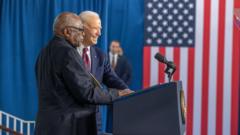The parliamentary voting mishap marks an unprecedented hurdle, sending shockwaves through Germany's political landscape and raising questions about economic stability and coalition unity.
Friedrich Merz Faces Setback in Chancellor Bid Amidst Political Turbulence

Friedrich Merz Faces Setback in Chancellor Bid Amidst Political Turbulence
Friedrich Merz's first round of voting for Germany's chancellorship fails, signaling potential challenges for the new leader.
In a surprising turn of events on May 6, 2025, Friedrich Merz, the leader of Germany's conservative Christian Democrats, was unable to secure the required parliamentary votes to become chancellor during the first round of voting. The setback came as a disappointment, not only for Merz but also for his coalition partners, amid mounting economic and political challenges facing the nation. With just six votes short of the necessary 316 majority, the failure in the secret ballot marked the first time a candidate for chancellor did not win in the first round since the establishment of the modern German state.
The first-round vote saw 307 lawmakers vote against Merz, alongside nine abstentions, raising eyebrows concerning the unity within his coalition and hinting at dissent among his own party ranks. Lars Klingbeil, anticipated to become the next vice chancellor, announced a second vote would be held on Tuesday afternoon, emphasizing the urgency of stable governance for Germany's future.
The implications of Merz's initial defeat were quickly felt on the stock market, with German shares declining by approximately 1.6% shortly after the voting results were announced. Economists expressed concerns that Merz's inability to demonstrate a clear mandate could undermine his agenda aimed at revitalizing growth in Europe's largest economy.
Complications surrounding Merz's candidacy began earlier in the year, marked by controversial immigration policies which sparked nationwide protests and shook his standing amongst lawmakers. His attempt to collaborate with the far-right Alternative for Germany (AfD) backfired, resulting in a lack of vital support from within his coalition that ultimately contributed to his failure on Tuesday.
Hayward analysts now anticipate an uncertain path ahead for a fresh government without a swift resolution, particularly as stakeholders look for decisive action to facilitate a revival of the stagnant economy intertwined with issues of departure from historical trade relationships and looming defense responsibilities amid global tensions.
With another vote approaching, all eyes will remain on Merz, who must showcase political fortitude to steer Germany through this challenging political landscape, seeking to solidify support from lawmakers while courting foreign partners keen on Germany's renewed role in European leadership amid shifting alliances.
The first-round vote saw 307 lawmakers vote against Merz, alongside nine abstentions, raising eyebrows concerning the unity within his coalition and hinting at dissent among his own party ranks. Lars Klingbeil, anticipated to become the next vice chancellor, announced a second vote would be held on Tuesday afternoon, emphasizing the urgency of stable governance for Germany's future.
The implications of Merz's initial defeat were quickly felt on the stock market, with German shares declining by approximately 1.6% shortly after the voting results were announced. Economists expressed concerns that Merz's inability to demonstrate a clear mandate could undermine his agenda aimed at revitalizing growth in Europe's largest economy.
Complications surrounding Merz's candidacy began earlier in the year, marked by controversial immigration policies which sparked nationwide protests and shook his standing amongst lawmakers. His attempt to collaborate with the far-right Alternative for Germany (AfD) backfired, resulting in a lack of vital support from within his coalition that ultimately contributed to his failure on Tuesday.
Hayward analysts now anticipate an uncertain path ahead for a fresh government without a swift resolution, particularly as stakeholders look for decisive action to facilitate a revival of the stagnant economy intertwined with issues of departure from historical trade relationships and looming defense responsibilities amid global tensions.
With another vote approaching, all eyes will remain on Merz, who must showcase political fortitude to steer Germany through this challenging political landscape, seeking to solidify support from lawmakers while courting foreign partners keen on Germany's renewed role in European leadership amid shifting alliances.






















